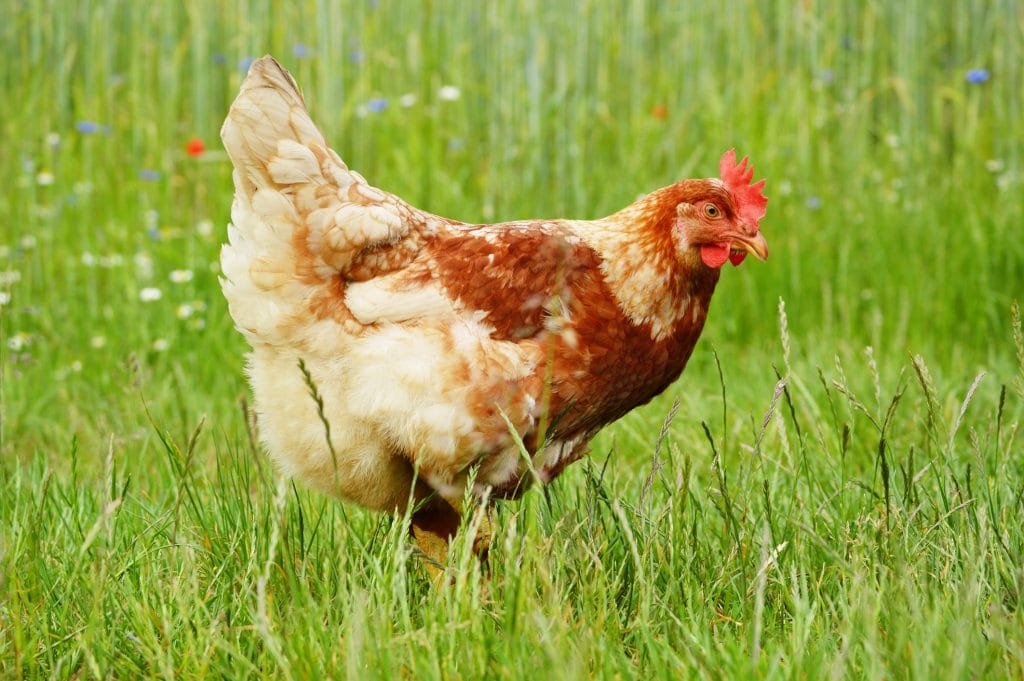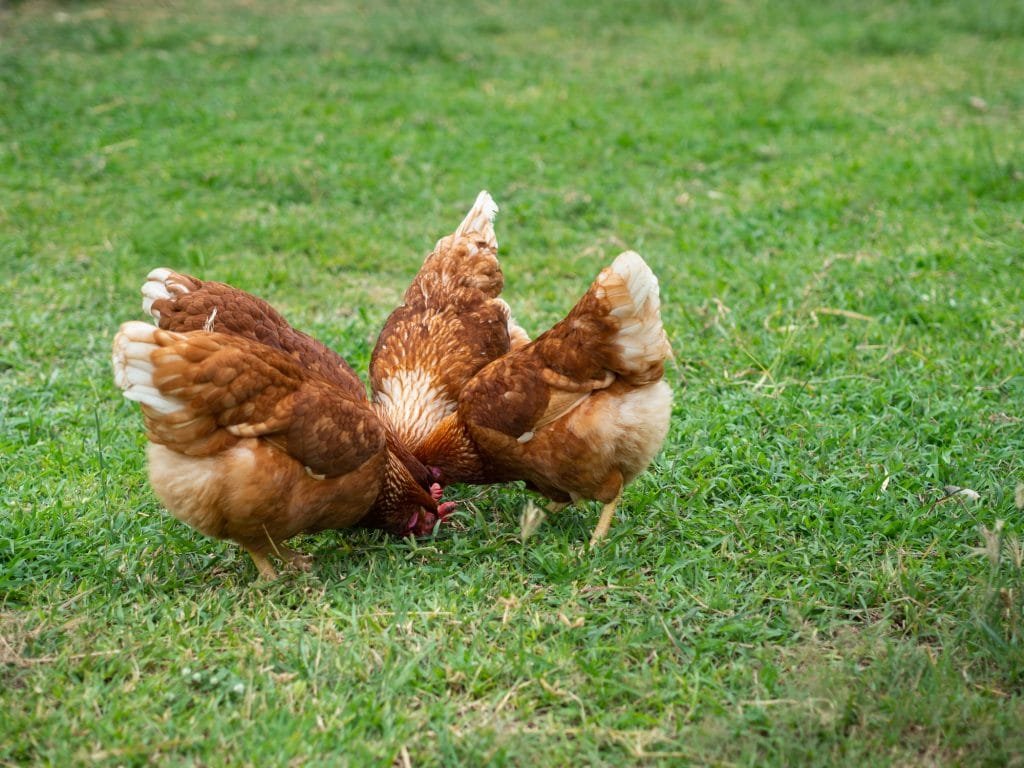This post contains affiliate links.
If you have a large yard with a big lawn, you might be thinking of getting a few chickens. These popular birds are not only fun pets, but they can be helpful to keep garden pests like snails and locusts at bay. However, there is more to keeping chickens than just leaving them to free-range on grassy patches.
Chickens cannot live entirely on grass. Although they will enjoy having access to grass and will eat the tips of grass blades, they do need a balanced chicken feed to stay healthy. Young chicks require chicken growing mash, and laying hens should receive laying pellets or an oyster shell supplement.
We all want our poultry to be healthy and happy. Whether they live in a coop, a chicken tractor, or are free-range, knowing the correct way of feeding them means that they will stay healthy and be able to provide a steady supply of eggs.

Can Chicken Live On Grass Alone?
If you have chickens, you have probably noticed them pecking at green grass and wondered if, like cattle or sheep, they can survive on pasture. The answer is a definitive no. Chickens are omnivores and have very different dietary requirements from herbivores.
Chickens will enthusiastically spend time on a green lawn and will actively peck at the tips of grass blades. They enjoy having access to grass and eating greens, which is a very healthy part of their diet. However, grass should only form a small section of their overall diet.
Fortunately, chickens will not naturally overeat grass if they are free-ranging. Allow them to scratch and forage on lawn or pasture and let them eat as much grass as they want while also searching for protein-rich snacks like bugs and seeds. A word of warning, though – a flock of chickens can quickly demolish a patch of lawn as they enthusiastically search for tasty insects.
To keep chickens healthy and laying well, provide them with a balanced chicken feed and a continuous supply of clean water. Sometimes it’s difficult to keep your chickens water clean especially if they are pooping in it. Find out how to stop this behavoir in my article, How To Stop Chickens From Pooping In Their Water. They will also appreciate additional fruit, vegetables, and even table scraps that are not high in oils or salt. If you keep chickens, very little leftover food ever needs to go to waste!
- 【Chicken Water Feeder】Automatic chicken waterers are the perfect addition to your...
- 【Leak-Free Design】Ensure a steady water supply for your birds with our leak-free...
- 【Wide Range of Applications】Our bird feeder kit is the ideal solution for a variety of...
Chickens most certainly love grass, but be extremely cautious about providing lawnmower clippings to a flock of poultry kept inside a coop. Free-ranging chickens peck off the short top tips of grass blades. They also naturally combine grass intake with other food, so they don’t end up with a crop that is only full of long fibrous grass.
Lawnmower trimmings are often long pieces of grass, which can result in crop impaction or sour crop if consumed in excess. This is because long stringy bits of grass cannot pass through the chicken’s digestive tract easily. If you want to provide lawn clippings to your flock, it should be chopped or milled into finer pieces and not offered in excess.
Although chickens cannot survive exclusively on grass, there are a lot of benefits to allowing your chickens to free-range on grass. These include:
- They have greater access to variety in their diet
- It will reduce your feed costs
- They will naturally eradicate garden pests like snails and bugs
- They get exercise so don’t have weight problems
- Free-ranging provides them with stimulation, and they are fun to watch
- Eggs are a richer orange color
- They can naturally fertilize the grass
- Free-range chickens attract fewer flies
While it is a good idea to allow your chickens to spend time on grass, it is best if you can rotate the areas, especially if you have a large flock. Chickens can quickly decimate a lawn and scratch out grass patches, searching for grubs and tasty morsels. They might even make small holes to take dust baths.
Keep your chickens from spending time on particular patches of grass by throwing a handful of dried mealworms or another protein-rich favorite in an area where you want them to focus their scratching activity. Chickens are delightful and can be highly entertaining creatures.

Can Chickens Live Without Feed?
Free-ranging chickens is simply allowing them to supplement their diets with things that they find outside. Chickens are not native birds, and to stay healthy and produce a consistent supply of eggs, they need to get enough nutrition to meet their requirements.
Although you can mix your own feed rather than purchasing a ready-made poultry mix, chickens must get enough protein and other essential nutrients to support good health, and that will provide the extra nutrition required during every stage of their lives. One of the first signs of an incorrect diet is decreased egg production. If you find your chickens are lookings skinny, check out my article What to Do if Your Chickens Are Skinny.
Chickens go through various stages when incorrect feeding will be particularly evident and can take its toll on your flock. Malnourished chickens will also be more prone to disease.
Besides growth and maintaining good health, chickens also need additional feed during some critical periods:
- While developing new feathers after mounting,
- Hens need enough calcium to lay shells with strong shells without depleting their body reserves
- Hens need enough body fat stored to survive periods of brooding
- Tiny chicks need nutrients provided in a finer, mash form to thrive
- Poultry may need additional feed during periods of extreme weather, for example, prolonged rain or cold snaps.
Unless you have a massive area of consistently bug-laden land and a minimal number of chickens, it is not possible to let them ‘live off the land.’ They will quickly eat everything in the vicinity of the coop and pretty much till the area in search of things to eat.
Once chickens have depleted an area, their health will be negatively affected. They may even develop behavioral issues like cannibalizing weaker chickens to obtain the nutrients they require. This can be avoided by providing chickens with adequate feed and allowing them to free-range and consume vegetation like grass, simply as a healthy supplement.
Providing a balanced chicken mix for your flock is not only essential for their health, but it is also a great way to manage the chickens. By providing feed at a specific place, they can be trained to return to the coop when necessary and lay in the provided nesting areas so eggs can easily be collected. Pellets are one of the most common ways to provide food to your chickens, learn more in my article Do Chickens like Pellets?
- 7-GRAINS: Our scratch grains for chickens provide a high-protein, high-fiber, and...
- ENGAGING & NATURAL: Our chicken feed, free from artificial colors and flavors, uses...
- NON-GMO: Naturally non-GMO, our chicken scratch feed is essential for maintaining health...
Final Thoughts
Allowing your chickens access to the outdoors is an excellent way to supplement their diets, and they will enjoy pecking blades of grass. Chickens cannot live entirely on grass and need to receive a diet that is rich in protein and other essential nutrients.


